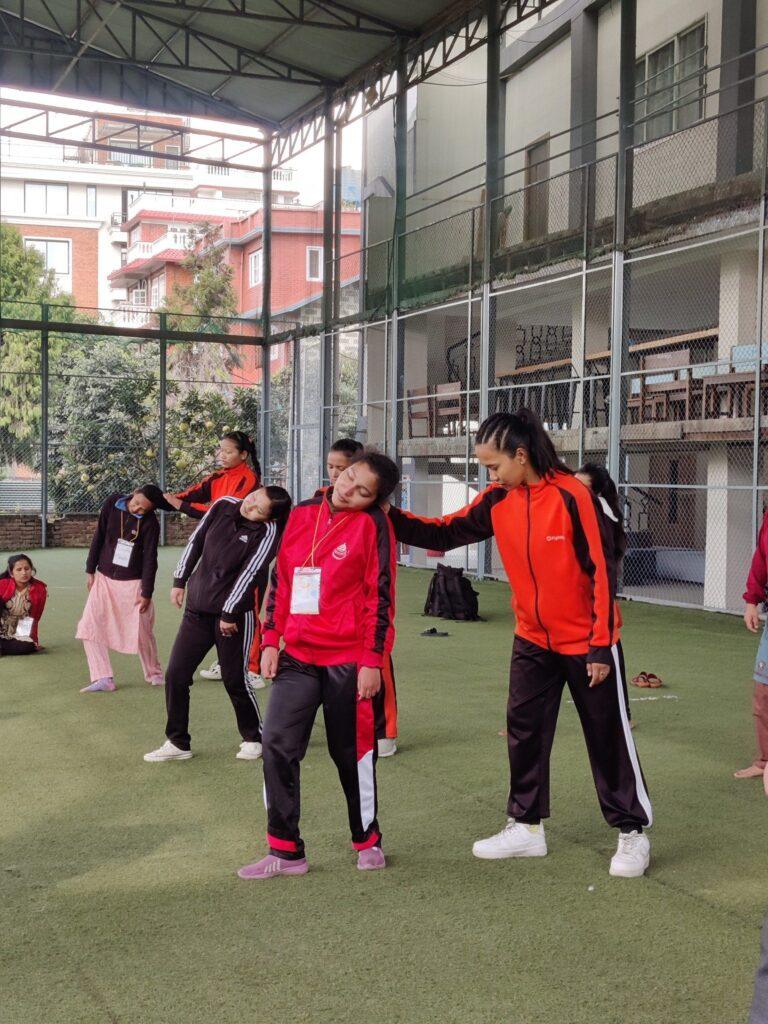
Prayatna Nepal is a self-help organization working for the living condition women and girls with visually impairments. The organization is established by the composition of both women with and without visually impairments. Among the seven board members, five of them (71%) are with visually impairments, and the organization is led by totally blind women as the President. This idea of inclusion in the organizational structure is to ensure equal efforts from every individual with a better understanding of improving the social, cultural, economic, and political aspects of lives of women with disabilities.
The first day of fight-back training was started by Ms. Sarita Lamichhane, Chairperson of Prayatna Nepal. She welcomed all the participants and trainers from the training institute "Fight Back". She also briefly introduced Prayatna Nepal and then proceeded to share objectives of the training. After that, there was an introduction round among participants, facilitators, trainers, and organizers. After the introduction session, Ms. Pooja Gurung was invited to officially start the training session with theory classes. She started the session by asking the participants about their understanding of violence. She then explained further about the types of violence and how we can identify it. She also played the video of previous trainings conducted by the institute to point out the importance of fight-back training. She further talked about violence and its types and engaged the participants in discussions by asking questions. She also shared some possible ways to avoid or deal with violence. After her session, the second half of the session was carried out by Ms. Rabina Lama, physical trainer of the training institute. She started the session with warm-up exercises to gear up the participants. After a short warm up session, she gave practical demonstrations on Save Our Soul (SOS) block, a technique to save oneself from possible physical attack or violence. While practicing SOS block, the participants were also encouraged to use their voice against violence, for which they were taught to shout out loud and scream. This was a way to alert the offender by giving a message i.e.,“No means No”. Similarly, the participants also learnt about palm strike which is a way to block physical attack using one’s palm.
On the second day of training, Ms. Pooja Gurung started by facilitating theory session on Good Touch and Bad Touch. She oriented the participants on the good touch and bad touch and ways to react on the bad touch by the help of different body parts. After this session, Ms. Rabina Lama started the practical session with body warm-up exercises. After the warm-up session, the participants repeated the SOS block and palm strike that they had learned the day before.
On the third day, Ms. Pooja Gurung conducted a theoretical session on fear and its management. She also described situational awareness through Jeef Cooper’s “Color Code”. Accordingly, there are different levels of awareness based on colors. For instance, white relates to total unawareness, yellow means relaxed awareness, orange refers to a specific alert that has triggered full attention, and red means ready to defend oneself. She further clarified to the participants how to react during possible attacks. Then she handed over the floor to Ms. Rabina Lama, who started with some physical exercises and self-defense techniques. She also taught about ear strike and eyes poke techniques to attack the offender. She also trained the participants on using white cane as a medium to keep themselves safe during possible attacks.
In the fourth day, Ms. Pooja Gurung facilitated on the types of cybercrime through the different examples. She also shared the ideas of maintaining social media safety and security. In addition, she shared the idea on ways to identify the culprit in social media and keeping oneself safe in social media. She stressed that social media is a very good platform that provides many opportunities and entertainment, but one must be aware and put their safety first in the digital world to enjoy freedom. Then, Ms. Rabina Lama took over the floor and started the practical session with warm-up exercises. After that, she made the participants repeat the techniques they learnt in the previous days. Ms. Rabina along with other assistant trainers, helped the participants perfect the techniques with repeated practice.
In the fifth day, Ms. Pooja Gurung started the session by playing and explaining a video on social media safety awareness. She also did revisions on previously taught and discussed topics by asking questions of the participants and correcting them when needed. After that, Ms. Rabina Lama took over with practical sessions. She facilitated the participants in recalling the overall physical techniques they learned and made them repeat it. Other assistant trainers also helped in mitigating confusion by showing demonstrations of the techniques to the participants. Ms. Sarita Maharjan, Community Development Officer of Lalitpur Metropolitan City, was invited as a chief guest to witness the practical session of the training and distribute certificates to the participants. After the practical session, there was a small closing ceremony, which was hosted by Ms. Sarita Lamichhane, Chairperson of Prayatna Nepal. She requested participants share their five-day experiences of fightback training. After that, Ms. Pooja Gurung was also requested to give remarks highlighting the importance of fight-back training. Ms. Sarita Maharjan was invited to share her remarks as the chief guest. She also distributed the certificates to the participants. Ms. Sabita Lamichhane, secretary of Prayatna Nepal, facilitated the certificate distribution by reading aloud the contents of the certificate to the participants. Ms. Sarita Lamichhane concluded the event by expressing gratitude to everyone involved directly and indirectly in the training program.


